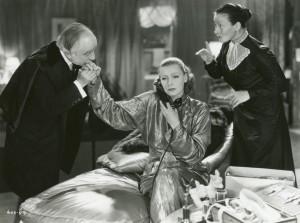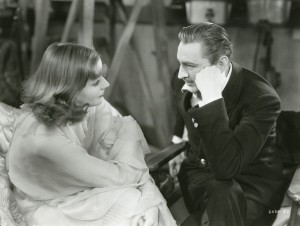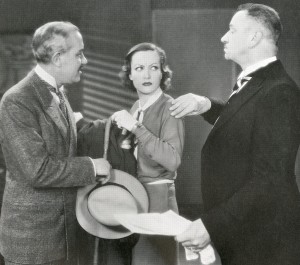by Barb Lentz
The five movies Bob provided for me from which to choose were these:
Ace in the Hole (The Big Carnival) (1951)
Becket (1964)
Dr. Cyclops (1940)
Grand Hotel (1932)
Napoleon (1927)
I chose Grand Hotel, which features John and Lionel Barrymore, who I believe are the most famous brother actors of their time, and I was curious to see them act together. It also stars Greta Garbo as well as Joan Crawford. I had heard of the movie, but had never seen it.

Grand Hotel is a black and white film set in contemporary Germany. The setting is an upscale hotel in the city of Berlin. The movie begins by focusing on each of five people, giving you an introduction to five individual stories. Of course, you know that somehow these individual lives and stories will intertwine as the movie progresses. Doctor Otternschlag (Lewis Stone) states that “nothing ever happens here”. Many things do happen during the course of the film, and one of them is quite surprising. Dr. Otternschlag is involved in the story, but at the end he again states “nothing ever happens here” with perfect irony.
Greta Garbo portrays a Russian ballerina who is deriving no joy or reward from her perofrmances. She delivers her famous line in this movie, “I want to be alone.” Joan Crawford portrays a stenographer. She and Greta are connected through a Baron, played by John Barrymore, who flirts with both of them. The Baron has borrowed money from the wrong people and is forced to steal in order to repay them. These story lines and the tale of an industrialist, played by Wallace Beery, working to merge his company with another, intertwine.

The thing that really stood out to me about this vintage movie was the difference in the composition of the shots. The actors were always extremely close to each other, thereby allowing the camera to have an extreme close-up of them in one shot. This is quite different from the way that films are normally shot, which involves cutting between two people because they don’t fit together within the frame. Instead, the actors are very close, especially in romantic scenes, and you get to see them act and react naturally without having the artificial reaction shots edited in. I like this method better.
My top five moments of the movie are:
1. When Mr. Kringelein (Lionel Barrymore) explains to his lawyer that he is not physically well and that he has decided to withdraw all of his money and enjoy the remainder of his days. He tells his lawyer to rip up his will.
2. When the Baron (John Barrymore) is very gracious and a gentleman to Otto Kringelein, even though Kringelein is portrayed as being of a “lower class”. Throughout the story, even when he is trying to fulfill his commitment to those from whom he borrowed, the Baron is a gentleman. It shines through.

3. When Mr. Kringelein, although ill, gets to tell his very rude employer (Wallace Beery) what he thinks of him. Not many workers get the opportunity to tell off a company big shot like this. Kringelein spends his money on a new well-fitting suit, and enjoys the fruits of his labors by enjoying his time at the expensive Grand Hotel.
4. When the Russian ballerina (Greta Garbo) transforms her personality after she and the Baron spend time together. She goes from being so depressed that she nearly commits suicide to dancing around the room after rapidly falling in love with the charming Baron.
5. When the industrialist finally gets what is coming to him. I did not like him from the beginning, as he is pompous and arrogant. It seems that he is honest, but when he is in the heat of negotiation, he makes a dishonest choice. Then, to make matters worse, he makes a play for the stenographer, who is interested in the Baron, against her good judgment. Preysing overreacts when he catches the Baron stealing his money, even after the count returns it. The industrialist takes it upon himself to punish him, and the Baron pays the ultimate price. But then, finally, Kringelein’s real strength is revealed and Preysing is unable to get away with murder.
Is Grand Hotel a classic? I believe so. It is interesting how the stories intertwine, and the ending is certainly compelling. It has wonderful performances, and is a wonderful introduction to some of these actors whom I’ve never before seen. My favorite character was that portrayed by John Barrymore, mainly because he was so charming and forthright. The movie has the well-known and often-quoted phrase by Greta Garbo, but it should be remembered for much more than that.
BRL 8 February 2014.
Grand Hotel (September 11, 1932) MGM.
Directed by Edmund Goulding. Produced by Irving Thalberg.
Written by Vicki Baum, from her play.
Principal Cast (character, performer):
Grusinskaya Greta Garbo
Baron Felix von Geigern (“Flix”) John Barrymore
Flaemmchen Joan Crawford
General Director Preysing Wallace Beery
Otto Kringelein Lionel Barrymore
Dr. Otternschlag Lewis Stone
Senf (the porter) Jean Hersholt
112 minutes. B&W. Not Rated.
